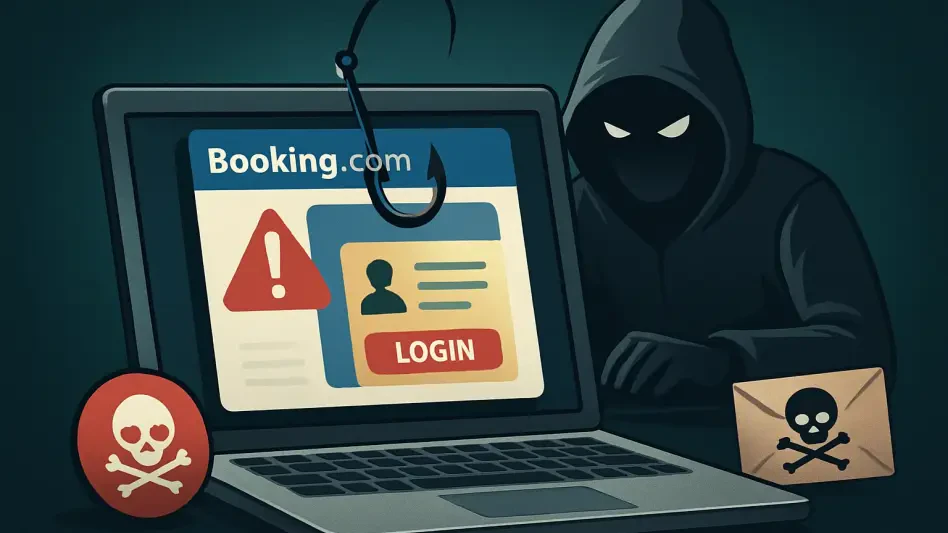Imagine a scenario where a trusted hotel booking platform becomes the gateway for cybercriminals to steal sensitive data and drain bank accounts. In the hospitality industry, where digital transactions are the norm, a sophisticated phishing campaign targeting Booking.com partner accounts has emerged as a stark reminder of the vulnerabilities in online systems. This review explores the intricate mechanisms of this malware-driven threat, dissecting its impact on the industry and the challenges in combating such advanced cybercrime.
Unpacking the Phishing Operation
This campaign, active for several months as of this year, relies on a deceptive strategy that begins with malicious emails. These messages, often sent from compromised hotel accounts or crafted to mimic Booking.com’s branding, target hotel staff with precision. The emails lure victims into a trap through a series of redirections, exploiting human error to initiate the attack.
At the heart of this scheme lies a social engineering tactic known as ClickFix, which manipulates users into executing harmful PowerShell commands. Once activated, these commands download a dangerous piece of malware, setting the stage for deeper system infiltration. The seamless integration of legitimate-looking communications makes it difficult for even cautious individuals to spot the fraud.
The hospitality sector, including platforms like Airbnb, Expedia, and Agoda alongside Booking.com, remains particularly vulnerable due to its heavy reliance on digital interfaces. Cybercriminals exploit the inherent trust users place in these established brands, turning a strength into a critical weakness. This operation underscores a broader trend of professionalized cybercrime targeting industries with high volumes of sensitive data.
Technical Breakdown of the Malware
The primary tool in this phishing arsenal is PureRAT, a remote access Trojan with devastating capabilities. Once installed, it grants attackers near-total control over infected systems, enabling them to steal credentials, capture screenshots, and extract confidential information. Its ability to operate covertly makes it a formidable threat to both businesses and individuals.
What sets PureRAT apart is its modular design, allowing cybercriminals to enhance its functionality with additional plugins. This adaptability ensures that the malware can evolve to bypass security measures, posing a persistent risk to affected systems. The sophistication of this tool reflects the growing technical prowess of threat actors in underground markets.
Beyond individual infections, PureRAT facilitates large-scale data theft by harvesting login details for booking platforms. These stolen credentials are often sold on illicit forums or used directly for fraudulent activities, amplifying the malware’s destructive potential. The technology behind PureRAT exemplifies how cybercrime has shifted toward scalable and customizable solutions.
Scope and Impact of the Threat
Since its detection, this campaign has shown remarkable persistence, with hundreds of malicious domains remaining active for months into this year. The operation’s timeline reveals a calculated effort to maintain pressure on targets, adapting to include other platforms like Agoda. This expansion highlights the scalability and relentless nature of the attackers’ approach.
The real-world consequences are severe, as attackers leverage stolen partner credentials to impersonate legitimate entities. By contacting hotel guests via email or WhatsApp with seemingly authentic booking details, they direct victims to counterfeit pages designed to steal payment information. These fake sites, often hosted behind protective services like Cloudflare and tied to foreign infrastructure, are crafted to evade detection.
Financially, the toll on victims is staggering, with many forced to pay twice for reservations—once to the legitimate hotel and again to the cybercriminals. The underground market for Booking.com credentials, where prices range from $5 to $5,000, further illustrates the lucrative nature of this fraud. Reports of significant profits by key players in these illicit networks reveal the economic incentives driving such attacks.
Challenges in Mitigation
Detecting and neutralizing this threat presents substantial technical hurdles due to the campaign’s use of legitimate-looking communications. The advanced social engineering tactics, paired with sophisticated malware like PureRAT, often bypass traditional security protocols. This complexity makes it difficult for organizations to identify and respond to infections in a timely manner.
Another obstacle lies in tracking and dismantling the network of malicious domains that sustain the operation. Many of these sites remain operational for extended periods, indicating a resilient infrastructure that resists takedown efforts. The prolonged activity of these domains compounds the risk to unsuspecting users and businesses alike.
The hospitality industry faces a broader challenge in safeguarding sensitive customer data amid an increasing reliance on digital platforms. Balancing user convenience with robust security measures remains a delicate task, especially as cybercriminals continue to exploit systemic vulnerabilities. This campaign serves as a critical case study in the ongoing struggle to protect digital ecosystems from evolving threats.
Verdict and Path Forward
Reflecting on this detailed examination, it becomes clear that the phishing campaign targeting Booking.com partner accounts is a highly organized and persistent threat. The combination of social engineering, advanced malware like PureRAT, and a thriving underground market for stolen data has positioned this operation as a significant risk to the hospitality sector. Its impact, from financial losses to eroded trust, has left a lasting mark on victims and platforms alike.
Looking ahead, actionable steps must prioritize enhanced cybersecurity frameworks tailored to the unique needs of online booking systems. Implementing stricter authentication protocols and real-time monitoring of suspicious communications could help mitigate similar threats. Collaboration between industry stakeholders and cybersecurity experts will be essential to stay ahead of evolving tactics.
Furthermore, educating both staff and customers about the risks of phishing and the importance of verifying communications offers a proactive defense. Investing in advanced detection tools and fostering a culture of vigilance can reduce the likelihood of successful attacks. As cybercrime continues to adapt, the hospitality industry must commit to ongoing innovation in security practices to protect its digital future.








